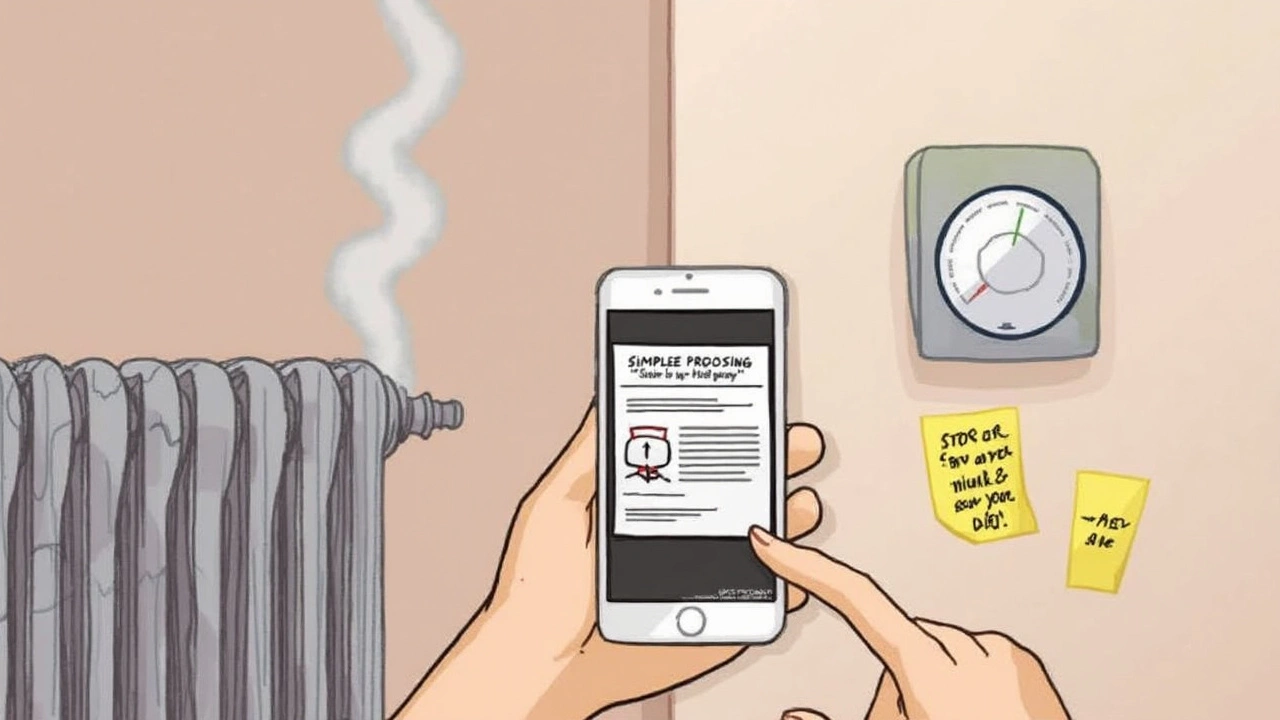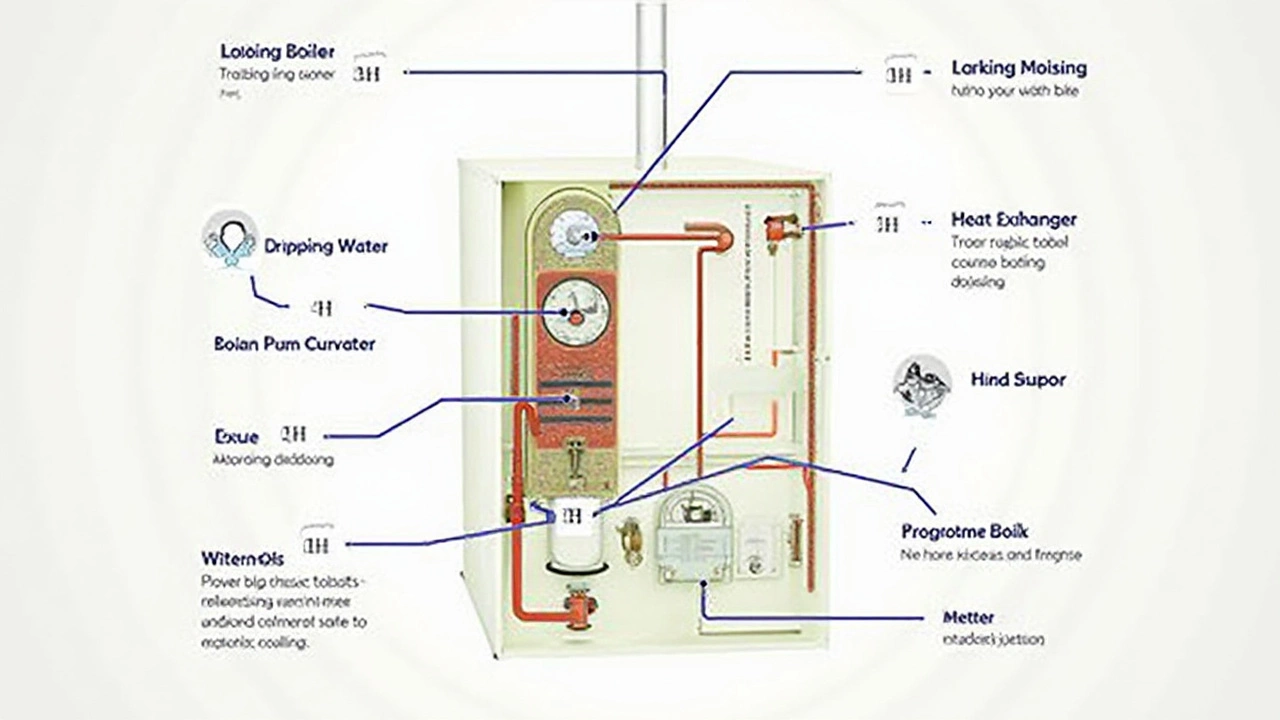Something feels off with your boiler? Don't panic—most issues have pretty obvious warning signs if you know where to look. If your radiators are cold or making odd sounds, or you spot puddles under the boiler, your system is trying to tell you something's up.
Before you pull out your wallet or your hair, grab a flashlight and start with the basics. Check if the boiler is switched on and the display is normal. Take note of any warning lights or error codes—these are basically your boiler’s way of telling you exactly what hurts, like a check engine light on your car.
Remember: boilers need water to create heat, so pressure is a big deal. If your system pressure gauge is lower than 1 bar, you’ll probably have heating trouble. If it’s spiking above 3, that’s also a problem and can lead to leaks or worse.
- Spotting Warning Signs Early
- Checking for Leaks and Pressure Problems
- Understanding Boiler Noises
- What to Do If There’s No Heat or Hot Water
- DIY Fixes vs. When to Call a Pro
Spotting Warning Signs Early
When your boiler problem starts, it doesn’t just go from perfectly fine to totally broken overnight. Usually, there are red flags that show up first. The sooner you catch them, the easier and cheaper things are to fix.
Here’s a quick list of things you can look for:
- Unusual noises—clanking, banging, or gurgling sounds can mean air in the system or even limescale build-up. Neither is good for your boiler repair bill.
- No heat or hot water—this one’s obvious, but lots of folks blame the thermostat or weather. If the house is cold and showers are freezing, check if the boiler is actually firing up.
- Leaking water—if you see damp patches underneath, pay attention. Leaks aren’t just messy. They ruin floors and can shut down the boiler altogether.
- Boiler pressure keeps dropping—you shouldn’t have to top up the pressure every week. This could mean there’s a hidden leak or a problem with the pressure relief valve.
- Strange smells—boilers should never leak gas or any weird fumes. If you notice a smell, especially something like eggs (which points to a gas leak), open the windows and get everyone out of the house. Call the gas emergency line.
- Pilot light or display errors—a flashing light or an error code usually gives clues about the fault. Write it down or snap a photo—it’ll help with troubleshooting or when you call for a boiler diagnosis.
A lot of British homes have boilers since they’re more energy-efficient. According to Energy UK, over 80% of UK homes use them. But most homeowners miss early warning signs and only act once the heating fails, which drives up repair costs and can leave the house freezing in winter.
Ignore any of these warning signs and you risk running into bigger boiler repair headaches. Trust your gut—if something feels off, it probably is. Take notes on what you see and hear. The better info you have, the faster you’ll sort out any boiler problem.
Checking for Leaks and Pressure Problems
Leaks and dodgy pressure are the big headaches in boiler problem diagnosis. Let’s get right to it—puddles, damp spots, or rusty streaks under the boiler usually mean trouble. Ignoring leaks can lead to serious water damage or a ruined boiler.
Start your check by looking underneath and around the boiler casing for water. If you find any, trace it back to its source. It could be a loose pipe joint, a faulty pressure relief valve, or even a corroded part. Don’t forget to check the visible pipes—these are famous for slow drips that can go unnoticed for ages.
Next, check the pressure gauge—this little dial is key for boiler repair. Most home boilers work best at 1 to 2 bar when the system is cold. If you spot the needle below 1, you’ll probably get lukewarm radiators or no hot water. On the flip side, if it’s above 2.5 or even 3, that high pressure can trigger leak points or cause the safety valve to dump water on the floor.
If you’re not sure about your boiler’s sweet spot, the manufacturer’s sticker or manual should tell you. Here’s a quick comparison table for common home boiler pressures:
| System Cold | Healthy Pressure |
|---|---|
| Regular boilers | 1-1.5 bar |
| Combi boilers | 1-1.5 bar |
| System boilers | 1-1.5 bar |
If you need to top up the pressure, use the filling loop—usually, a silver flexible hose under the boiler. If pressure drops again soon after topping up, that’s a red flag for a leak somewhere.
- Don’t keep topping up without finding the leak—it can damage the boiler long term.
- If leaks are near electrics, turn off the power and call a boiler repair pro.
- If you notice constant low pressure and can’t find a leak, it could be an issue like a failed expansion vessel inside the unit.
Stay sharp for water stains on ceilings or floors near radiators and pipes too. Even a small leak left unchecked can cost way more in home repairs than fixing the boiler problem early on.

Understanding Boiler Noises
Weird noises coming from your boiler can be alarming, but they're also huge clues for diagnosing boiler problem issues. Not all sounds mean disaster, so knowing what each noise points to will save you stress—and spare parts.
If you hear banging or clunking (called "kettling"), your boiler might have built-up limescale inside the heat exchanger. This is super common in hard water areas and actually reduces your boiler's efficiency over time. A power flush or a descaler treatment can help fix it.
A whistling or squealing sound, almost like a kettle about to boil, is usually a sign of trapped air, low water pressure, or (again) limescale. Bleeding your radiators is the classic fix, but if that doesn't help, check the system pressure on the gauge—if it’s out of range, add or release water per the manual.
Gurgling noises usually mean air is stuck in the pipes. It’s not as serious, but if left alone, it’ll make your system less effective. Again, bleeding the radiators is your first move. If you keep hearing gurgling, there could be a pump or water flow issue in your boiler.
- Banging or Clunking: Likely limescale or sludge
- Whistling: Air trapped or pressure problems
- Gurgling: Air in pipes or water flow issues
- Buzzing or Humming: Possibly a failing electrical component, or a loose part
According to a 2022 industry survey, kettling accounts for about 20% of boiler repair callouts in areas with hard water. So, if you live somewhere with chalky taps, it’s not just you.
| Noise | Possible Cause | Quick Check |
|---|---|---|
| Banging | Limescale build-up | Check for hot spots on boiler casing |
| Whistling | Low water pressure, trapped air | Bleed radiators, check gauge |
| Gurgling | Air in system | Bleed system again |
If any noise gets worse or the boiler cuts out, stop and call in a boiler repair pro. Persistent or very loud sounds usually mean something’s gone beyond a minor fix.
What to Do If There’s No Heat or Hot Water
If you suddenly have no heat or hot water, your boiler problem could be something simple or a sign of a bigger issue. Don’t jump to the worst-case scenario yet—let’s walk through the basics first. These steps cover over 70% of reasons people lose heat and hot water at home.
- Check your thermostat: Make sure it’s turned on and set high enough for the heat to kick in. Sounds obvious, but it’s an easy one to miss.
- Look at the boiler display: Is there an error code or flashing light? Grab your boiler manual or look up the code online for your model. Some common ones like F22 or E1 mean low pressure or problems with water flow.
- Double-check the pressure: Your pressure gauge should read between 1 and 2 bars when the system is cold. If it’s lower, your boiler probably won’t work. You can repressurize it by opening the filling loop (but don’t overdo it).
- Pilot light or ignition issues: Modern boilers often have electronic ignition, but older ones still use a pilot light. If yours is out, follow the relighting instructions—usually found on a sticker inside the boiler panel.
- Listen for sounds: Clanking or gurgling can mean air trapped in the system or even a frozen pipe—pretty common in winter.
If everything above looks normal, it might be a faulty part. Pumps, valves, and thermostats fail over time. Also, don’t forget to ask everyone at home if they’ve fiddled with radiator valves or accidentally turned off a switch on the boiler or fuse box.
Check out this quick data on the most common causes behind no heat/no hot water calls in the UK last year:
| Cause | % of Cases |
|---|---|
| Low System Pressure | 38% |
| Thermostat Issues | 22% |
| Faulty Pump/Valve | 17% |
| Pilot or Ignition Failure | 13% |
| Frozen Pipes | 10% |
If you spot something obvious—like zero pressure or a tripped power supply—fix that and your boiler repair might be good to go. If all else fails, call a pro, especially if you smell gas or hear loud banging. Don’t mess around with gas or electrics trying to save a few quid.

DIY Fixes vs. When to Call a Pro
Alright, let’s get real about what you can fix yourself and what needs an expert touch. Boilers can be fussy, but not every boiler problem means you have to shell out big money. Sometimes, the fix is quick and painless—other times, you do not want to risk your safety or void your warranty by going too far.
Let’s break it down:
- Low Pressure: If the pressure gauge is below 1 bar, most manufacturers are cool with you topping it up using the filling loop. Just go slow and close the valve tight when you’re done. Watch that pressure doesn't go above the suggested range (usually around 1–1.5 bar when cold).
- Resetting the Boiler: If your model has a reset button, and you’ve already checked the manual for instructions, go for it. This solves a surprising number of weird errors after power cuts or gas supply hiccups.
- Bleeding Radiators: If parts of your radiator are icy while others are hot, air is probably trapped inside. Grab a bleed key (they’re a couple of bucks at hardware stores) and a towel, and let the air out. This is one of the most common boiler repair steps.
- Pilot Light Issues: Modern boilers generally don’t have pilot lights, but if you’ve got an older system and the flame goes out, your manual will show you the safe way to relight it. Never try this if you smell gas—call for help.
Here’s what you should leave to the pros:
- Persistent Leaks: If you notice water below the boiler or around pipe joints, a DIY patch job might make things worse. Leaks can lead to electrical damage or hazardous mold. Let a trained boiler repair tech investigate.
- Strange Noises: Banging, clanking, or gurgling could mean anything from low water to scale buildup or a faulty pump. If bleeding your radiators doesn’t help, stop and get an expert in.
- No Heat or Hot Water: If you’ve tried the thermostat and pressure checks with no luck, the problem could be a failed part—maybe the diverter valve, thermostat, or circuit board. These are best left to someone certified.
- Smell of Gas: This is a straight-up emergency. Don’t touch anything electrical, don’t light a match, get outside, and call your gas supplier or the emergency line right away.
Here’s a quick cheat sheet:
| Problem | DIY Fix? | Call a Pro? |
|---|---|---|
| Low Pressure | Yes | If it won’t hold pressure |
| Bleeding Radiators | Yes | No |
| Pilot Light Out | If safe, yes | If odor or can’t relight |
| Leaking Boiler | No | Yes |
| Boiler Error Codes | If manual says yes | If codes persist |
| No Heat/Hot Water | Maybe | Yes |
| Gas Smell | No | Immediately |
Sticking to what you know protects both your boiler and your wallet. Even simple jobs can feel intimidating, so if you’re ever unsure, a qualified boiler repair tech can keep things safe and up to code.
